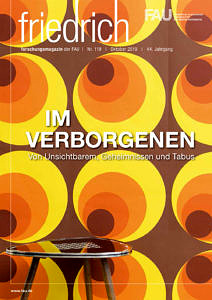friedrich 120: Astounding journeys
friedrich 120: Astounding journeys

Dear readers,
Some of you may know the poem by the American poet Robert Frost: ‘Two roads diverged in a wood, and I – I took the one less travelled by, And that has made all the difference.’ Each day of our lives we have to decide which roads to follow. Some are so familiar to us we can follow them in our sleep. However, we are often overcome by curiosity and seek out new, perhaps even risky paths on our journey. This is particularly true in academia. Researchers are always searching for new ways to find solutions to the major questions facing our society.
The topic of ‘pathways’ for this edition of friedrich is an obvious choice. We take a closer look at different pathways in various contexts, for example, why and how are people on the move? To be on the move can also be taken more literally, something we tend to neglect in today’s sedentary lifestyle. What changes can we make in this respect? And how are detours or workarounds created? As you can see, this edition of friedrich is branching out down various avenues.
I hope you enjoy reading it.
Prof. Joachim Hornegger, FAU President
Editorial of the research magazine friedrich: Astounding journeys
Research magazine friedrich:
download, get a copy or subscribe
- Download friedrich no. 120
- Copies of friedrich are available at various campus locations at FAU.
- You can also request a copy of the magazine to be delivered to your home address or your workplace. Please complete our subscription form.
Other FAU publications
Starting an academic career

On the move
Full steam ahead

Travel in the future

Refugees and migration

How our view of the world colours our perspective

Life at the border

Neologistics

Get moving
One step at a time
What goes around comes around
A two-way street

Detour to success
Chasing the unknown

Work(around) in progress
Next stop: the unknown
Staying connected
Signal failure …
Travel for travel’s sake
Growing pains

Research magazine friedrich

Venture into hidden worlds together with FAU researchers from a wide spectrum of disciplines, ranging from the humanities to natural sciences, and from engineering to medicine. Read the latest 2019 issue of the FAU research magazine ‘friedrich’. Read more
- Print run: 6,500 copies
- Length: 80-100 pages
- Publication frequency: 1 issue annually
- Distribution to: Professors, lecturers, FAU employees in institutes, clinics and in administration, students, friends and supporters, decision makers in ministries, companies, research institutes who collaborate with FAU, members of universities in Germany and abroad as well as media representatives.
Contact for advertising:
Kulturidee GmbH
-
- Verena Rudert, phone: +49 911 81026-25, e-mail: verena.rudert@kulturidee.de
- Sina Wagner, phone: +49 911 81026-27, e-mail: sina.wagner@kulturidee.de
- Published by: Friedrich-Alexander-Universität Erlangen-Nürnberg, Schlossplatz 4, 91054 Erlangen, the President, Schlossplatz 4, 91054 Erlangen, phone: +49 9131 85-0, fax: +49 9131 85-22131
- Responsible for content: Friedrich-Alexander-Universität Erlangen-Nürnberg, Communications and Press, Dr. Susanne Langer, Schlossplatz 4, 91054 Erlangen, phone: +49 9131 85-70200, fax: +49 9131 85-70207, presse@fau.de
- Editor: Katrin Piecha
- Layout: zur.gestaltung, Nürnberg







